BOOKS.
THE SOUTHERN SLAVS.f
Ritsroxstste politicians, although they hare at times indicated with sufficient clearness the general objects for which we are now fighting, have so far very wisely abstained from speaking with any degree of precision of the terms of peace which we hope to secure at the close of the war. The fact that those terms will depend not solely on our own• views, but also on those entertained by our Allies, is in itself a full justification for this reticence. Nevertheless, a few leading ideas on this important subject have taken possession of the public mind. It appears to be very generally recognized that the principal object we have in view is to deliver a decisive blow which will finally crush the predominance of the system somewhat vaguely termed militarism, but more accurately described as Kaiserism ; that the provinces of Alsace-Lorraine should be restored to France ; that Belgium should bi rehabilitated and compensated ; that the Kingdom of Poland should be reconstituted ; that Italy should receive the Trentino and also Trieste, which must become a free port ; and that the greater part, if not the whole, of the German colonies must pass from the possession of the vanquished to that of the victors. All these are points which are ree‘illy comprehensible to the British public. The settlement of Near Eastern affairs is far more complicated. It may be doubted whether the people of this country are as yet at all alive to the vast importance of the political issues involved in the Near East. Yet it is essential that the aspirations of the Central Powers in connexion with Near Eastern policy should be understood, and that the extent to which the most vital British interests would be affected were those aspirations realized should be folly recognized. As Mr. G. Prothero has remarked in a recent very lucid and instructive pamphlet, entitled German Opinion and German Policy before the War, " the attempt to dominate the East forms the keystone of German Weltpolitik." The average Etiglisfiman is inclined to think that the Near Eastern question is primarily and chiefly a Turkish question, and that if the Turk were driven back to his original home in Asia and the Russians were installed at Constantinople—in both of which transactions he would be quite prepired to acquiesce—the issues which for some five hundred years and more bare distracted the whole of Europe would be finally set at rest. Mr. Wickham Steed and Dr. Seton-Watson, both of whom can speak with unrivalled authority on certain aspects of the Near Eastern question, have done excellent service in endeavouring to dispel these erroneous notions. The latter, in his most recent work, entitled German, Slav, and Magyar, dwells on the fact that Austria-Hungary, with her " eleven main races, ten principal languages, and twenty-three legislative bodies," constitutes a political puzzle which is most difficult of compre. hension, and that a far-sighted Russian, General Fadejev, pointed out
• "CI": abbreviation used In Army signalling to mean "Come In and check your results."
# German, RIM', end Mayor. By B. W. soton-watson, D.Litt. Loudon: Williams and Icorgate. [2a.11d. =LI so long ago as 1870 that " the Eastern question is a Slav question which can only be solved in Vienna."
In treating this subject the condition of English publics opinion prior to the outbreak of war must be borne in mind. In general, it may be said that sentiment, rather than a correct appreciation of the true nature of the political issues involved in the fate of Serbia, was allowed to predominate. The impression created by the murder of King Alexander and Queen Draga in 1903 had not spent its force. It was thought that the unexpected revival of mediaeval Byzantinia:n in its worst form which was revealed by this episode indicated the prevalence of a low state of public morality and civilization. Much sympathy existed for Bulgaria. It was held that the Bulgarians, after having borne the brunt of the war against Turkey, had been unjustly deprived of the fruits of their victory. The true character of King Ferdinand was not sufficiently appreciated. The treacherous and criminal attack made on the Serbian Army during the brief, but epoch- making, period when Dr. Daneff was Bulgarian Prime Minister was to some extent condoned. The murder of the Austrian Archduke and his wife stimulated a mistrust of Serbian methods. The un- reasonable brutality of the Austrian ultimatum, however, the manifest intention displayed by the Austrian and German Governments to listen to no arguments in favour of methods which might have preserved the peace of the world, and the heroin resistance offered by the Serbians to the invaders of their country, brought about a revulsion of public feeling. But even now the true cause for which. Serbia is fighting, and the fact that not merely the Serbians themselves, but the whole of Europe, are deeply interested in the success of that cause, are not fully appreciated. A good many people in this country probably hold that if Serbia is reconstituted, with possibly some small addition of territory, and if money com- pensation is paid for the losses which the Serbian nation has incurred, the requirements of the case will have been met. The diplomatic negotiations which took place in July, 1914, unfortunately tended to strengthen belief in this fallacy, for fallacy it is.. The British Ambassador at Petrograd informed the Russian Government that "direct British interests in Serbia are nil," and Sir Edward (now Viscount) Grey, in acknowledging the report of the conversation, said : " I entirely approve of what you said." It is very possible that these remarks of the Ambassador and of the Minister may be regarded as obiter dicta, and that they do not indicate any real disregard of the true issues involved in the future of Serbia. However this may be, it is certain that Dr. Seton-Watson is quite right in holding that, at the end of the war, it would be a grievous political error to take too limited a view of the Southern Slav question, and to confine action to some trifling readjustment of Serbian territory.
Some of the smaller countries of the world owe their importance largely to the accident of their geographical position. Egypt and Belgium are cases in point. Serbia is another. Serbia occupies a position of the highest strategical and political importance. " Just as in the Middle Ages Serbia lay across the path of the Turkish conquerors moving westwards, so last autumn she blocked the path of the German conquerors moving eastwards." It cannot be too clearly understood that the Drang nark Osten has constituted the corner-stone of the foundations on which all recent German policy has been built. The fact that at the commencement of the war the efforts of the German General Staff appeared to be exclusively directed to reaching Paris somewhat obscured this view of the question. The British public were disposed to think that German action in 1914 was analogous to that of 1870. In reality, no such analogy existed. In 1870, the Germans were fighting to secure German unity and nothing more. This almost necessarily led to a conflict with France. In 1914, the French contest was merely a side-show. The defeat of the French Army and the occupation of Paris were mainly regarded as indispensable preludes to the execution of an Eastern policy which had long been contemplated. This became apparent when the advance to Paris was checked. The true character of the war became manifest when King Ferdinand of Bulgaria threw off the mask and events developed in Mesopotamia. The real objective of the German Government was then revealed. That objective had been explained by numerous German writers long before the war commenced. Dr. Seton-Watson quotes from a pamphlet written by Herr Karl von Winterstetten, entitled Berlin-Bagdad: New Aims of Mid-European Policy. It may serve as a sample of ether similar utterances :—
" New peasant land, a great economic area, the salvation of Germanism in the Danubian Monarchy, the union of all Germans, a free path to the South-east, protection of the non-Slav races of the South-east against Pan-Slavism,—in short, Berlin-Bagdad. . . . On the execution of this task depends the future of our race. If we fail, there is no more habitable land in the world for the Teuton to hold as master, and it will be our fate to be cultural manure."
Here we have a definition of the policy of Deutschland fiber Nies, developed in its full or nearly full maturity. There are several ways of combating these sinister and ambitious projects. One of them is to maintain intact that naval supremacy which excites the boundless wrath of Count Reventlow, and which has induced him to term Great Britain the " Vampire of the Continent." But this alone would not suffice to secure tho object in view. Another highly efficacious method would be to adopt the policy advocated by Dr. Seton-Watson,
and described by Prinoe Alexander of Serbia as " the union in one single Fatherland of all the Serbs, Croats, and Slovenes, who are one people with the same traditions, the same tongue, the same tendencies, but whom an evil fate has divided." Further, Bohemia must be rendered autonomous. The disintegration of Austria would be a necessary consequence of these changes. The German provinces of Austria would fall to Germany. There is no reason why they should not do so. Their adjunction would be in strict conformity with the application of those Nationalist principles which are generally favoured in all democratic countries. Moreover, the addition of a South German population to the German Empire would possibly strengthen the revolt against that disastrous Prussian hegemony which has caused such fatal results, and which may not improbably receive a check from the Germans themselves when the present war is concluded.
The formation of a strong Southern Slav State, which would form a barrier against Teutonic aggression, ought not to encounter any opposition in Italy. Its creation would be distinctly favourable to Italian interests. The Hungarians will, of course, be violently opposed to any such political combination. The spirit which still animates the Magyars is the same as that proclaimed by Kossuth, who was only a Liberal when direct Magyar interests were at stake, when he said : " I know no Croatian nationality." This opposition should not, however, be allowed to stand in the way of the realization of the project. On grounds alike of sentiment and interest, the establishment of a Southern Slav Federation merits not merely the sympathy but the full support of the British Government. Thus, Dr. Seton-Watson says : "Tho small and land-locked Serbia of the past will be trans- formed into a strong and united Southern Slav State upon the eastern shore of the Adriatic, no longer seething with unrest as the result of Magyar misrule in Croatia and Austrian economic tariffs, but free at last to develop a national life which has resisted five centuries of Turkish oppression." Moreover, by the adoption of this plan not only would an act of political justice be performed, but a very valuable guarantee for the future peace of the world would be secured. Cnostast.































 Previous page
Previous page